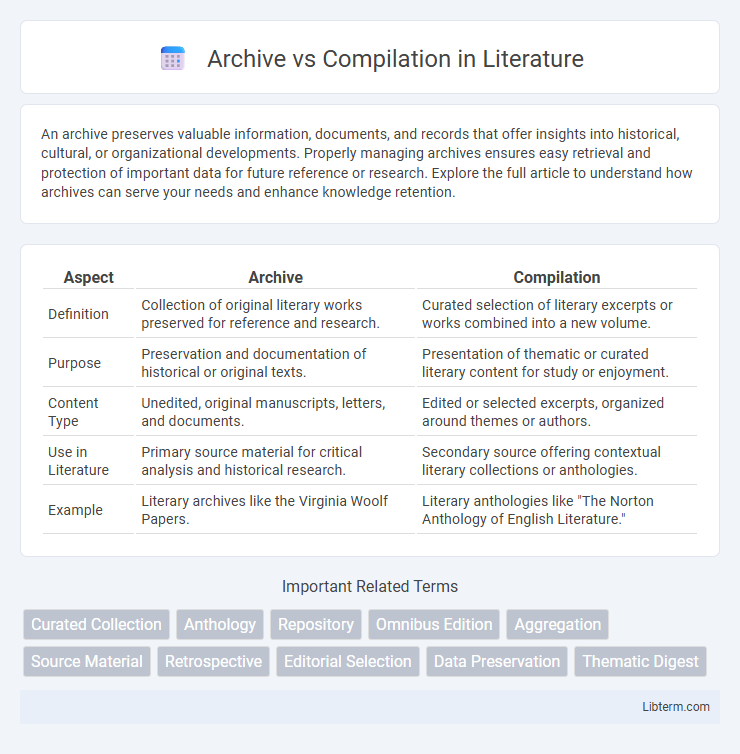An archive preserves valuable information, documents, and records that offer insights into historical, cultural, or organizational developments. Properly managing archives ensures easy retrieval and protection of important data for future reference or research. Explore the full article to understand how archives can serve your needs and enhance knowledge retention.
Table of Comparison
| Aspect | Archive | Compilation |
|---|---|---|
| Definition | Collection of original literary works preserved for reference and research. | Curated selection of literary excerpts or works combined into a new volume. |
| Purpose | Preservation and documentation of historical or original texts. | Presentation of thematic or curated literary content for study or enjoyment. |
| Content Type | Unedited, original manuscripts, letters, and documents. | Edited or selected excerpts, organized around themes or authors. |
| Use in Literature | Primary source material for critical analysis and historical research. | Secondary source offering contextual literary collections or anthologies. |
| Example | Literary archives like the Virginia Woolf Papers. | Literary anthologies like "The Norton Anthology of English Literature." |
Understanding Archives and Compilations
Archives consist of organized collections of original documents or records preserved for their historical, legal, or informational value, emphasizing authenticity and provenance. Compilations involve aggregating data or materials from various sources into a single, synthesized work, designed for easy accessibility and reference. Understanding archives requires recognizing their role in preserving primary evidence, whereas compilations focus on curating and presenting information for practical use.
Defining Archives: Key Features
Archives are collections of historical records or documents that are preserved for their long-term value and authenticity, often organized by provenance and original order. Key features include the preservation of original context, emphasis on primary sources, and the maintenance of metadata to ensure provenance and authenticity. Unlike compilations, archives prioritize original materials and their integrity over thematic grouping or editorial curation.
What Constitutes a Compilation?
A compilation consists of an original selection, coordination, or arrangement of preexisting materials or data that are independently created but collectively form a new work. The value of a compilation lies in the creative effort applied to organize or present the content, rather than in the individual components themselves. Protection under copyright law covers the unique structure and combination, not the underlying facts or materials included in the compilation.
Core Differences Between Archive and Compilation
An archive is a file containing one or more files that are combined for storage or transfer, often compressed to reduce size, whereas a compilation refers to the process of converting source code into executable programs or linking multiple object files into a single binary. Archives primarily serve as containers for bundling and compressing data without altering content, while compilation transforms source code into machine-readable code through syntactic and semantic analysis. The core difference lies in archives managing file packaging and storage, while compilation involves code translation and program generation.
Purpose and Use Cases of Archives
Archives serve as organized repositories designed to preserve original records, documents, and artifacts for long-term access and reference. They support research, legal evidence, cultural preservation, and historical documentation by maintaining the authenticity and context of materials. Unlike compilations that aggregate selected items for immediate use or analysis, archives prioritize comprehensive preservation and retrieval across time periods.
Typical Applications for Compilations
Compilations are commonly used in software development for creating executable programs by translating source code written in high-level languages into machine code. They play a crucial role in optimizing performance in applications such as operating systems, video games, and embedded systems. Unlike archives that bundle multiple files, compilations transform human-readable code into efficient, standalone binaries ready for deployment.
Legal Implications: Archive vs Compilation
An archive is a curated collection of original documents or data preserved for legal evidence and compliance, ensuring authenticity and chain of custody, critical in regulatory investigations. A compilation, by contrast, assembles data or information from various sources without original documentation, often limiting its reliability and legal standing in court due to lack of primary evidence. Intellectual property rights and copyright issues also differ, with archives typically protected as original works, while compilations may be protected only for the selection and arrangement of data.
Digital vs Physical: Managing Archives and Compilations
Digital archives offer instant access and efficient searchability, enabling seamless management of large datasets, whereas physical archives require meticulous organization and controlled environments to preserve material integrity. Compilation in digital form allows dynamic updating and easy distribution, contrasting with physical compilations that demand manual assembly and limited scalability. Effective management balances digital backup strategies with preservation protocols for tangible records to ensure comprehensive archival security.
Best Practices for Organizing Archives and Compilations
Organizing archives and compilations requires distinct best practices to ensure efficient retrieval and preservation. Archives should be systematically categorized by provenance, date, and subject matter to maintain the original context and authenticity of the records. Compilations benefit from thematic grouping, clear metadata, and consistent labeling to enhance accessibility and usability for research or reference purposes.
Choosing the Right Approach: Archive or Compilation?
Choosing the right approach between an archive and a compilation depends on the specific needs for data organization and accessibility; archives store original files in their native formats, preserving metadata and allowing for future retrieval and verification. Compilations transform, filter, or aggregate data into new formats or summary forms, optimizing for quick analysis but potentially losing original context. Understanding the purpose--whether long-term preservation and authenticity or efficient data analysis and presentation--guides the decision to use an archive or a compilation.
Archive Infographic

 libterm.com
libterm.com